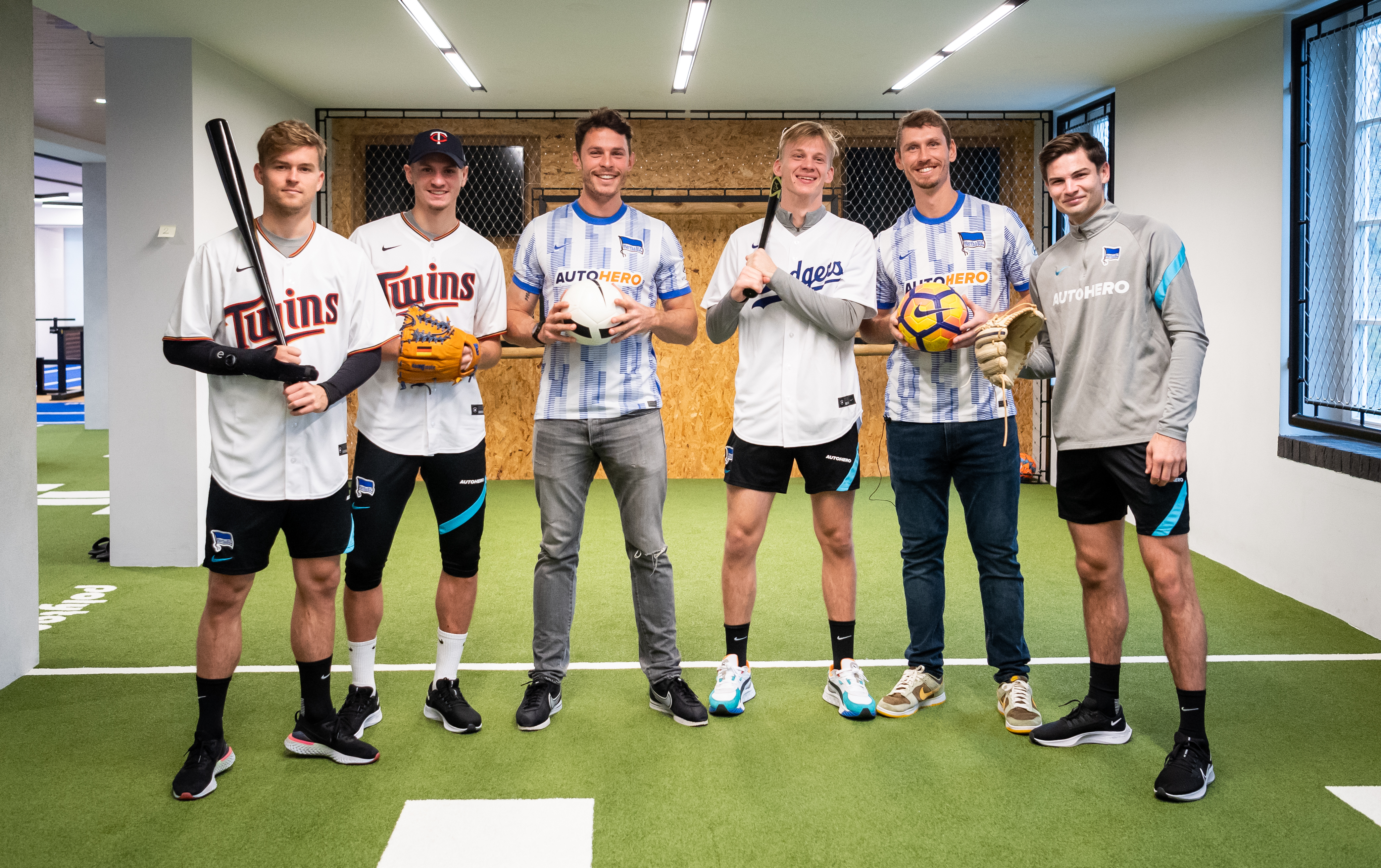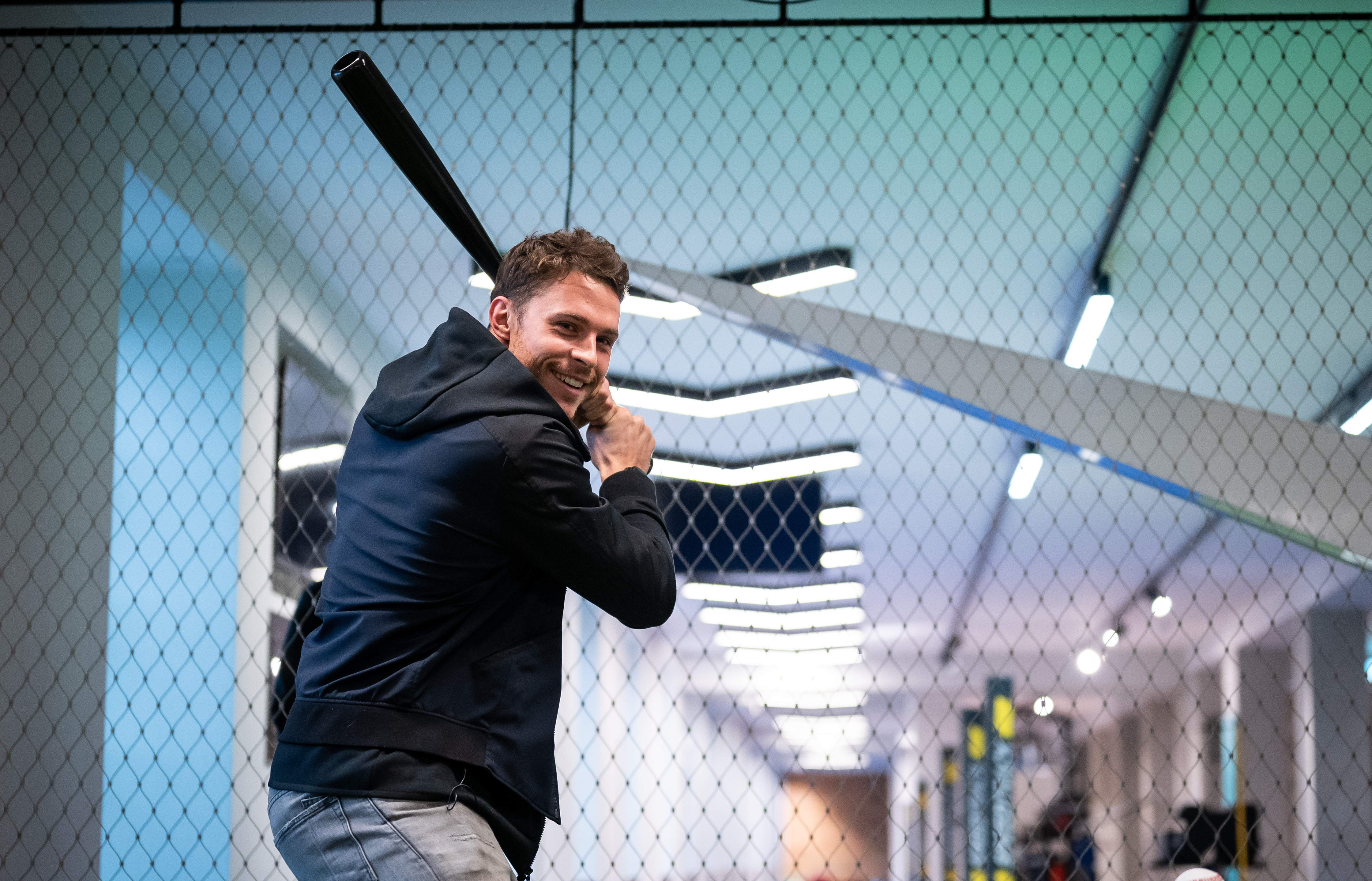
Max Kepler: “I would be a proper Herthaner”
When athletes from different sports get together, there’s always an exciting discussion – talk of unforgettable wins and painful defeats, of similarities and differences, but also about the normal everyday issues. When one of those athletes happens to not only be a Berlin-born baseball player that has made a name for himself in the United States, but also a former academy goalkeeper for the Blue-Whites, ‘interesting’ just doesn’t cover it. On Thursday, Max Kepler, outfielder for the Minnesota Twins in the MLB, was back in the German capital and paid a visit to his hometown club. Joined by former Twins pro and minor league pitcher Markus Solbach, the 28-year-old met up with Hertha sporting director Arne Friedrich, executive board member Paul Keuter and players Maximilian Mittelstädt, Márton Dárdai, Jurgen Ekkelenkamp and Oliver Christensen. As a keen Hertha fan, Kepler was already delighted to receive a home shirt as a memento, before Fredi Bobic also gifted him a club membership. The German-American took time for an in-depth chat with herthabsc.com to discuss his roots in Berlin, home-run records and parallels between baseball and football.
herthabsc.com: Max, it’s a pleasure to see you. You’re a Berliner, but these days it’s a place you come to on vacation. Looking at the 030 tattoo on your arm, it’s safe to say you still have a very close connection to the city, right?
Kepler: Absolutely. Berlin is my home, it’s where I grew up. At the moment, I can only visit Berlin for a short while during autumn after the season is over. It’s not often enough to be honest, but it’s always amazing to come back, especially because my family and friends all still live here. The city means so much to me, not just because of the great culture and food here. I couldn’t visit last year due to the pandemic – that was the first time I had stayed in the States. Even though I’ve been living in America for eleven years, it’s ultimately because of my work; I’m there because of baseball, but my heart remains in Berlin and it always will be. I want to come back here after my career is over.
herthabsc.com: Your parents used to dance at the Deutsche Oper opera house here in Berlin, but your path took you into sport. Where did that passion come from?
Kepler: I more or less grew up in the theatre because my parents were ballet dancers. They tried to get me and my sister to dance when were little, but neither of us were that into it (laughs). We were always at the theatre, and I still love going to museums and to all those events that often have so many interesting people at them from all over the world with different cultural backgrounds. My favourite thing to do though, was just having a kick around with my mates at Lietzensee. My parents told me a story about my dad putting four different balls and a pair of ballet shoes in front of me when I was little. I ignored the ballet shoes, the American football and the basketball, picked up the baseball and played with the football. I’m going to do the same with my kids one day (laughs).
[>]My dad put four different balls and a pair of ballet shoes in front of me when I was little. I ignored the ballet shoes, the American football and the basketball, picked up the baseball and played with the football.[<]
herthabsc.com: A perfect anecdote. The ball got smaller as you got older. You even played tennis for a while. How did you end up playing baseball?
Kepler: I went to the John F. Kennedy School, which is a German-American school in Zehlendorf. I was actually there at the same time as John Brooks for a while. Playing baseball just was something that came about while I was there. It started as a hobby, just about playing sport with my friends, that was until people told me I had the potential to make it as a pro baseballer.
herthabsc.com: You were actually a goalkeeper in our academy for a while before that though. Did you not fancy a career between the sticks?
Kepler: I wasn’t at Hertha all that long unfortunately. I played a couple of indoor tournaments, but it certainly wouldn’t have been easy to make it to the big time. The fact that I visited my mum’s American relatives in the States every summer wouldn’t have helped either. That gave me a chance to experience the level of baseball in the USA. It was insane – everything was so much bigger and better. When the idea of going to America started becoming more than just an idea, I was at a sports boarding school in Regensburg. I had to give up tennis and football, something my dad was a little disappointed about as a big football fan. There are certainly parallels between football and baseball. A goalkeeper has to protect his box and his goal, while in baseball, you have a corner to defend. I only wear one glove, but I still have to catch the ball. The hand-eye coordination you need in football no doubt put me in good stead.

[>]A goalkeeper has to protect his box and his goal, while in baseball, you have a corner to defend.[<]
herthabsc.com: Soon after, in 2009, you signed your first contract as a 16-year-old. You apparently had 16 offers from MLB teams. How do you deal with that kind of interest at such a young age?
Kepler: My parents were visiting me in Regensburg and we had met up with an agent who we had recently hired. We were at a shopping centre when all the phone calls started coming through. I wasn’t bothered about finances as a kid – I just saw it as a great chance to go to America and play baseball professionally. I wanted to test myself at the next level.
herthabsc.com: In America, it’s typical for players to prove themselves at minor league teams before they make it into the MLB. What was that period like for you?
Kepler: You always have those little doubts. Even now I ask myself what I would do if my baseball career was over tomorrow. Should I spend a few years studying? You don’t earn much in the minor leagues and, as a European player, I had to spend three or four seasons in them. I would sometimes ask myself what I’m doing in these small towns that I was being sent to. The stadiums were empty. I worked my butt off, but I wasn’t getting anywhere. I thought about quitting and going to college to secure my future. Fortunately, I got a lot of support from my family and friends. My parents told me that I should see through what I started. If you quit, you’re going to make it a habit. Luckily, that stuck in my head and I kept at it. I can say now that it was all worth it. But of course it’s only natural that there are moments where you question what the future holds.
[>]If you quit, you are going to make it a habit.[<]

herthabsc.com: You stuck it out and eventually made your debut for the Minnesota Twins in 2015. One year later, you hit your first home run. It’s something of a specialty of yours too, as you then set a new home-run season record for a European player in 2018. Do you sometimes have to pinch yourself when you think back to those moments?
Kepler: Now and again, but I don’t reminisce all that often. Sometimes friends or fans will send me videos of special moments, and sometimes I’m surprised of what I have achieved (laughs). But what happened in the past doesn’t matter. I have to stay grounded, keep working hard and putting in performances. There are a lot of people waiting to take my place. My goal remains to win the World Series. Personal records are cool, but it would be nicer to celebrate something with the team.
herthabsc.com: Of course, baseball, American football, ice hockey and basketball are all huge in the USA. Football is in the shadows a little. What are your thoughts about soccer, as you call it over there?
Kepler: American football draws the most fans, but there aren’t as many games as, say, baseball, so it’s hard to compare those two. Football is definitely growing in popularity. The stadiums are new, stunning and they’re often full. Of course, the traditional American sports are still the main focus. For football to reach the next level, better players have to move to the USA. At the moment, European players tend to go there towards the end of their career. I like going to Minnesota United games though – they’re our local MLS club.
herthabsc.com: Hertha actually beat them 1-0 in a friendly during our US tour in 2019.
Kepler: That’s right! Unfortunately, we just missed each other, but I was thrilled to find a Hertha shirt in my locker. I became a Hertha fan when I was still living in Berlin and always wanted to be in the Ostkurve, but my dad preferred sitting somewhere else. If I moved back here permanently, I would be a loyal fan – a proper Herthaner. I was buzzing when Prince came back. He is someone you can really identify with – a proper boy of the Berlin streets. Because of the time difference, I’m only able to watch highlights at the moment, but I always look out for the results and keep an eye on the table. My last trip to the Olympiastadion for a game was a while ago sadly, but it would be nice to go back soon, especially now I’m a member!
[>]If I moved back here permanently, I would be a loyal fan – a proper Herthaner.[<]
